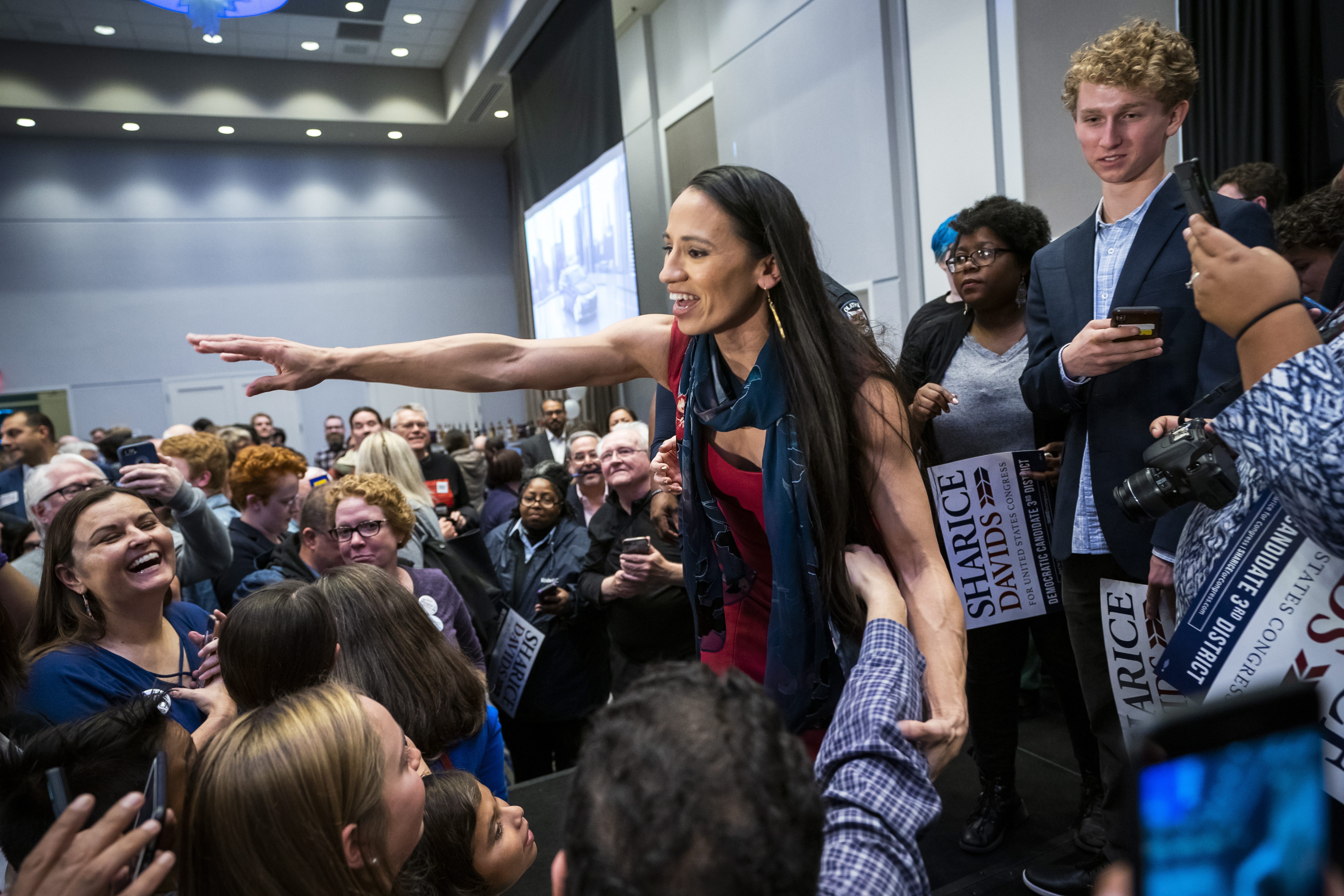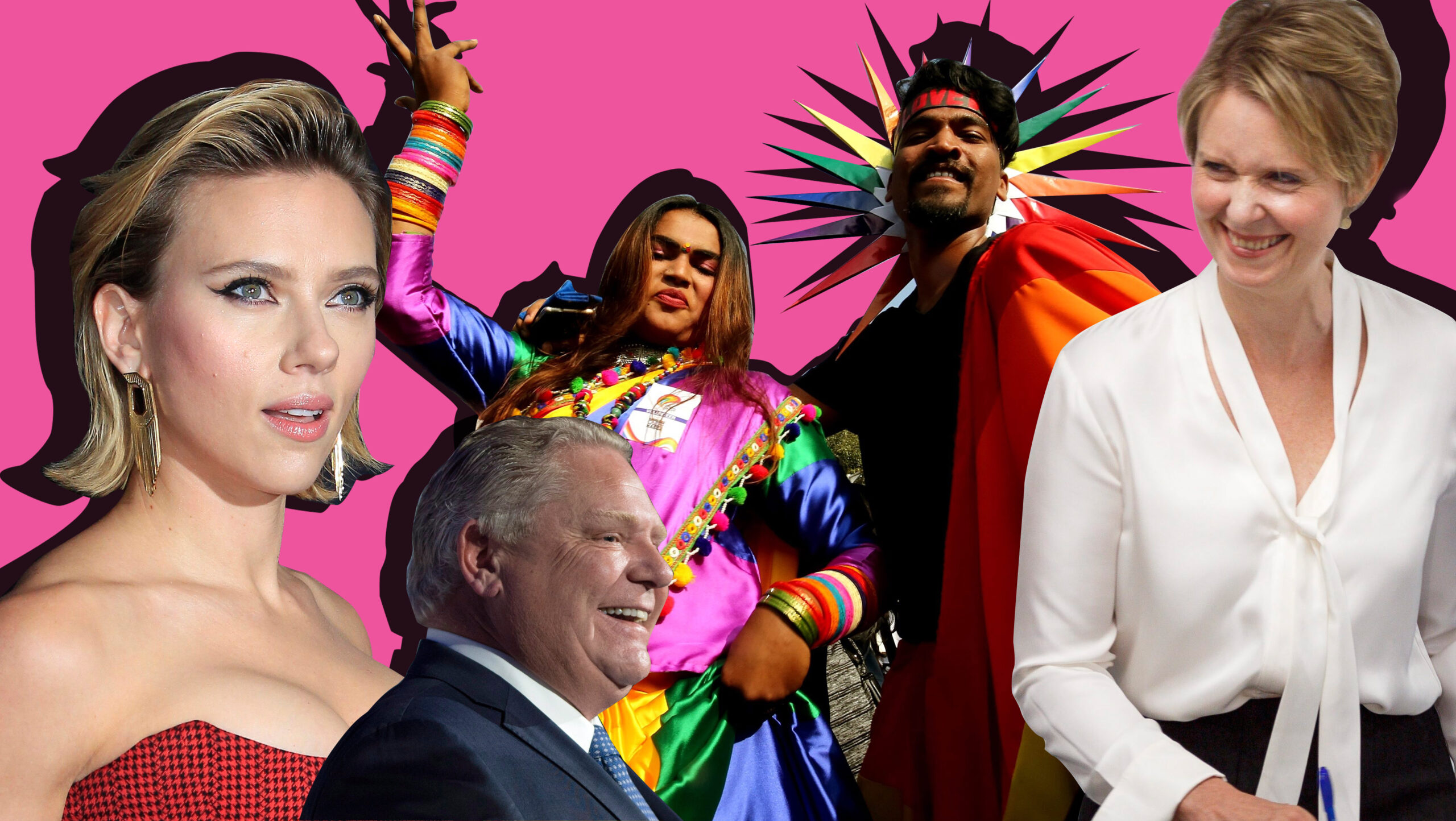It was a year that, at times, felt like a century — marked by attacks on trans rights and the horrific disappearances and deaths in Toronto’s Church-Wellesley neighbourhood; but also powered by the increasing strength of our creativity and resistance. Here’s a look back at the highs, lows and hunger games of 2018.
Serial killings devastate Toronto

Bruce McArthur shown during a preliminary court hearing on Oct 22, 2018. Credit: The Canadian Press/Alexandra Newbould
In January, Toronto’s LGBTQ2 community was shaken when police charged 66-year-old landscaper Bruce McArthur in connection with the deaths of two men from Toronto’s gay village. But the nightmare-ish turn of events didn’t stop there. Still more gruesome discoveries and details bombarded us throughout the year. McArthur faces eight counts of first-degree murder in the deaths of Selim Esen, Andrew Kinsman, Majeed Kayhan, Soroush Mahmudi, Dean Lisowick, Skandaraj Navaratnam, Abdulbasir Faizi and Kirushna Kumar Kanagaratnam. His trial is scheduled to begin in 2020.
A rainbow wave crashed on Trump Nation
A swell of LGBTQ2 victories in the US midterm elections revealed the power of queer resistance. Not only did the Democrats take control of the US House of Representatives, but more than 150 queer and trans candidates endorsed by the LGBTQ Victory Fund won nationwide. In a statement, Annise Parker, president and CEO of Victory Fund, said, “The rainbow wave touched down in state capitals throughout the country on Election Day — with an astounding number of out LGBTQ candidates shattering long-standing political barriers and becoming historic firsts.”
The highlights: Colorado’s Jared Polis became the first out gay man elected governor of any state. Minnesota’s Angie Craig and New Hampshire’s Chris Pappas became their states’ first out candidates elected to Congress. Kansas-elected Sharice Davids, making her the first gay Native American to Congress. Trans representation in state legislatures tripled with the election of Gerri Cannon and Lisa Bunker in the New Hampshire house of representatives.

Democratic House candidate from Kansas Sharice Davids after celebrating her election win Nov 6, 2018. Credit: EPA/Jim Lo Scalzo
Jennifer Webb became the first LGBTQ2 woman elected to the Florida state legislature, Gabriel Acevedo became the first Afro-Latino gay man to be elected to the Maryland general assembly, and Sonya Jaquez Lewis became the first LGBTQ2 Latina elected to the Colorado state legislature.
The takeaway: 2018 was a year of disruption and political movement — and queer people led it. From Cynthia Nixon running for the Democratic party’s nomination for governor of New York, to queer teenagers like Emma González and Sarah Chadwick leading the gun control movement, this year showed us that LGBTQ2 voices can’t and won’t be silenced.
Celebrities came out

Panic at the Disco frontman Brendon Urie. Credit: panicatthedisco/Giphy
We all swooned this year when Tessa Thompson said that she and Janelle Monáe “love each other deeply” and then left the rest to our collective imagination. They weren’t alone in making big announcements in 2018: Panic at the Disco’s Brendon Urie came out as pansexual and actor Lee Pace (Halt and Catch Fire) came out as “a member of the queer community.” Writer Daniel Mallory Ortberg came out as trans just days before the release of his latest book The Merry Spinster: Tales of Everyday Horror. And, in a reversal of the usual scenario, singer Shawn Mendes revealed in Rolling Stone that he is . . . straight.
Right-wing attacks on queer and trans students

Then-councillor Doug Ford takes questions from the media outside his brother Toronto Mayor Rob Ford’s office at Toronto City Hall on Feb 11, 2014. Credit: Fred Lum/The Globe and Mail
In July, Ontario Premier Doug Ford announced that his newly-installed government would be repealing the current sexual-education curriculum, sending all students back in time to the year 1998. This meant that the revised curriculum, which was introduced in 2015 by the Liberals to include an emphasis on sexuality, gender identity and sexual consent, would not be taught to students in the upcoming fall school year.
The decision angered teachers, parents, advocates and students alike, sparking so much fiery resistance: educators refused to teach the old curriculum, causing old man Ford to threaten their jobs as well as implement a snitch line in which anyone could call and complain about teachers not following the new curriculum. Then families planned to launch a human-rights case over the outdated curriculum, which they said is harmful to youth, especially LGBTQ2 students. Next, came student walkouts, with teens demanding the comprehensive sexual education they deserve.
In November, the PC party passed a resolution to debate whether the party should remove the teaching and recognition of gender identity, which former candidate and Ford pal Tanya Granic Allen said was “a highly controversial, unscientific ‘liberal ideology.’” Ugh. (Ford said that he wasn’t moving forward with it, but the PCs’ wishy-washy stance on the whole sex-ed fiasco makes this promise less than credible.)
And to make this all laughable (read: tragic?): Consultations on the curriculum found that the majority of parents actually support the updated 2015 sex ed. Survey says: DUH!
Alberta Conservatives have also been trying to get their hands on youth-related issues that don’t involve them: outing students in gay-straight alliances. GSAs, social clubs set up by students to offer support, have been an emotional and contentious issue for politicians and communities in the last few years. And some parents want to know when their child has joined one. Advocates say revealing this information could be detrimental for students, because their parents may react negatively.
This month, a legal challenge against Bill 24, which is about GSA clubs in schools, went before a three-judge panel, where over two dozen faith-based schools argued that it restricts information to parents. We say: This is not a parental issue!
#CoupleGoals2018

Ernie and Bert from Sesame Street. Credit: natethegreat27/Tumblr via Giphy
It made for the best rose ceremony ever: Minh Thu and Truc Nhu, two female contestants on The Bachelor Vietnam, ditched the dude and ran off with one another. Speaking of rivals turned lovers: Team USA hockey player Meghan Duggan and Team Canada’s Gillian Apps got married in September.
Teen power pair King Princess and Amanda Stenberg made their official couple debut at the MTV VMAs; while singer Teddy Geiger, who came out as trans last year, and Schitt’s Creek actor Emily Hampshire, announced their engagement in November. Finally, a gay former Sesame Street writer acknowledged what our pre-school gaydar intuited years ago: Bert and Ernie are, indeed, a loving couple.
Rights around the world

LGBT activists in India celebrate during a rally after the verdict at the Supreme Court in Kolkata, Eastern India, on Sept 6, 2018. Credit: EPA/Piyal Adhikary
First the good news: There was dancing in the streets from Bangalore to Delhi to Mumbai, after the Indian Supreme Court ruled unanimously in September to overturn a colonial-era law criminalizing homosexuality. In his decision, Chief Justice Dipak Misra wrote, “social exclusion, identity seclusion and isolation from the social mainstream are still the stark realities faced by individuals today, and it is only when each and every individual is liberated from the shackles of such bondage . . . that we can call ourselves a truly free society.”
Two months earlier, the High Court in Trinidad and Tobago issued a final ruling on the country’s Sexual Offences Act, which criminalized gay sex between consenting adults. The law wasn’t overturned, as many hoped, but it was amended to now only ban “acts of serious indecency” between people under the age of 16. Activist Jason Jones called it a “bittersweet victory, but a victory anyway.”
Scotland became the first country in the world to incorporate queer history and politics into its mandatory curriculum — with no exemptions. Education secretary John Swinney said, “Our education system must support everyone to reach their full potential. That is why it is vital the curriculum is as diverse as the young people who learn in our schools.”
Thailand is posed to make history with a proposed marriage equality bill that would make it the first Asian country to legalize same-sex marriage. Some queer activists, however, remain concerned that the bill, which would create a separate law for gay couples rather than expanding the existing definition of marriage, still treats same-sex couples as second-class citizens.
And now the bad: In November, voters in Taiwan rejected same-sex marriage in a referendum, following a 2017 high court ruling that deemed the ban on gay marriage to be unconstitutional.
Malaysia became increasingly dangerous for LGBTQ2 people in 2018: In September, two women were publicly caned after being caught having sex in car. It was the first time such a punishment was imposed in the country, and it followed a police raid on gay club in Kuala Lumpur and a vicious attack by a mob on a trans woman, which left her with broken ribs, a broken backbone and a ruptured spleen. Thilaga Sulathireh, co-founder of trans rights group Justice For Sisters, told the press: “We are under attack in an unprecedented way.”
Elio crying by the fireplace was all of us

Elio in Call Me By Your Name. Credit: @suze/Giphy
We hugged ourselves tight as we watched Elio crying by the fireplace during the end credits of 2017’s Call Me By Your Name. We felt actual feels and this year, mainstream award giving bodies noticed. This spring, Call Me By Your Name received 217 nominations and won 93 awards, including this year’s Oscar for best adapted screenplay.
And the gay boy domination of the big screen continued into 2018. Love, Simon, based on Becky Albertalli’s YA novel Simon vs the Homo Sapiens Agenda, made us relive the beauty of puppy love and root for Simon and his coming-of-age story. The film made history as the first time a major film studio featured an LGBTQ2 lead. It also spurred intense online fandom and opened to more US theatres than Call Me By Your Name and Moonlight combined.
Queer and trans lit was lit

Danez Smith at the 68th National Book Awards on Nov 15, 2017 in New York. Credit: Evan Agostini/Invision/AP
In his award-winning poetry collection This Wound is a World, Billy-Ray Belcourt conjures a decolonized world where “everyone is at least a little gay.” And the queer Cree writer, who became the youngest ever winner of the Griffin Poetry Prize, might have been talking about the entire state of the literary world in 2018, too, because it was a banner year for LGBTQ2 writing. There were brilliant new books by Dionne Brand (Theory and The Blue Clerk), Vivek Shraya (I’m Afraid of Men), Lindsay Nixon (nîtisânak), Amber Dawn (Sodom Road Exit) and Casey Plett (Little Fish) — among many others.
Gay playwright Jordan Tannahill won the Governor General’s literary award for drama for his two plays Botticelli in the Fire and Sunday in Sodom; Black, queer American writer Danez Smith became the youngest ever winner of UK’s prestigious Forward prize for their collection Don’t Call Us Dead. The New York Times wrote a glowing story about the current boom in transgender literature and storytelling, mentioning the work of Canada’s Plett and Kai Cheng Tom.
Screen queens

Ryan Murphy’s TV drama Pose. Credit: @poseonfx/Giphy
Queer representation was so good this year, we cancelled our weekend plans and binge-watched instead. Ryan Murphy’s drama Pose debuted on FX with the largest ever cast of trans actors as series regulars, and Season 2 of Netflix’s GLOW introduced a lesbian romance between two women of colour. Cartoon Network’s Steven Universe made us swoon with its historic same-sex proposal.
If romance isn’t your thing, CW introduced Thunder, the first Black lesbian superhero on TV, in its show Black Lightning. See? Queer representation truly popped the corn and fed the children this year (and yes, that’s a quote from the actual winner of RuPaul’s Drag Race All Stars 3, Shangela — we said that ).
Thanks for the multiple eargasms

Janelle Monáe and Tessa Thompson in the music video “PYNK.” Credit: @janellemonae/Giphy
Queer music and musicians made us wanna Cirque du Soleil our way to the dancefloor. This year blessed us with Troye Sivan’s sweet, sweet ode to bottoming in “Bloom” and Janelle Monáe’s Grammy–nominated album Dirty Computer and its accompanying short film that celebrates Black queer femininity.
At home, queer people were also acknowledged and celebrated. In September, Two-Spirit classical musician Jeremy Dutcher won the Polaris Music Prize for his album Wolastoqiyik Lintuwakonawa, which is performed entirely in Dutcher’s Wolastoq language.
And outside North America, K-pop fans were shook when South Korean singer Holland debuted his first single and its accompanying music video, “Neverland”, in January. The video features a gay boy wanting to escape the societal prejudices. Holland, the first openly gay K-pop idol, said in an interview, that he wants to use his music to tell queer people it’s okay to love who they want to love.
A special place in hell

Scarlett Johansson at the world premiere of Avengers: Infinity War in Los Angeles on April 23, 2018. Credit: Jordan Strauss/Invision/AP, File
Let’s start with the Trump administration considering revoking civil rights for transgender people by requiring citizens to identify as the gender listed on their birth certificates. This happened the same year that the administration retracted transgender rights in schools, bathrooms, prisons and military. What this would mean is that trans people are shoved into situations of discomfort and perhaps, exposing them to circumstances that could potentially endanger their lives.
Speaking of people wanting to erase trans identity, let’s talk about the most, um, versatile actress of this generation: Scarlett Johansson. She almost played the trans character, Dante “Tex” Gill, in Rupert Sanders’ Rub & Tug, but after an online outcry and backlash, Johansson exited the project.
Also, let’s not forget the baker who refused to bake a cake for a same-sex couple in Colorado (because apparently it’s ungodly to make dessert for the gays ), the dad who forced his own kid to have sex with his stepmother to “cure” him from being gay and self-proclaimed “MAGA candidate” Beverly Goldstein who said “illiterate Black heathens are to blame for gay rights.”
Our favourite thirst traps

Credit: @jasmyn/Giphy
This year, Sahara left Africa and relocated to people’s throats — and we have two words to blame for it: thirst traps. Some caught us off-guard, while others we embraced like Katniss Everdeen volunteering as tribute. Hold your water bottles and prepare to hydrate, because this is a dry journey down memory lane.
First stop, 13 Reasons Why actor Ross Butler trapped our dreams in February when he dropped this on Instagram. Then, our world was flipped when Britney Spears’ boo Sam Asghari dropped a video of him and the Circus singer working out. Then a trap that we respectfully volunteered to be caught in: Love, Simon’s Keiynan Lonsdale spreading his legs for the heavens and making us all pray for mercy.
As if that’s not enough, the universe really dehydrated us when Ricky Martin posted this photo and made us all beg for oasis. And finally, let’s remember Shawn Mendes’ VMA performance where he was drenched in the rain and became the visual image of the extreme opposite of what’s happening in our throats.




 Why you can trust Xtra
Why you can trust Xtra


